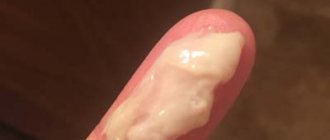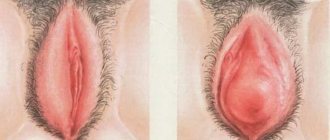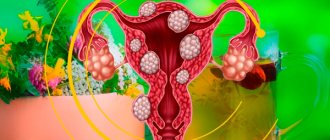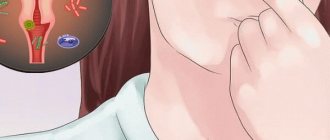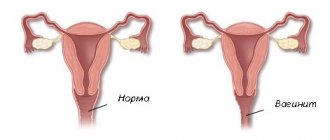Women experience whitish vaginal discharge during a certain period of the menstrual cycle. This phenomenon is normal and does not pose any health threat.
However, the appearance of brown, greenish, yellow discharge, which has a specific unpleasant odor, indicates the development of problems in the genitourinary system.
Before sounding the alarm, you need to understand the cause of the pathological condition, and then decide how to get rid of the discharge - with folk remedies or traditional medications.
How to get rid of female discharge without resorting to medication
Women experience whitish vaginal discharge during a certain period of the menstrual cycle.
This phenomenon is normal and does not pose any health threat. However, the appearance of brown, greenish, yellow discharge, which has a specific unpleasant odor, indicates the development of problems in the genitourinary system.
Before sounding the alarm, you need to understand the cause of the pathological condition, and then decide how to get rid of the discharge - with folk remedies or traditional medications.
The main causes of pathological leucorrhoea
Any vaginal discharge that begins spontaneously and does not resemble normal menstrual discharge indicates illness in the body. Doctors identify a number of factors that can cause leucorrhoea that is unusual for a healthy body:
- gynecological diseases;
- improper bowel function;
- diseases of hematopoiesis and circulatory system;
- parasitic intoxication;
- long-term use of oral contraceptives;
- stagnation in the pelvis.
Yellow discharge
Yellow discharge, as a rule, indicates quite serious diseases, which should not be treated without a gynecologist . Home therapy can distort the symptoms and nature of the manifestation of the pathology, as a result of which the attending physician may make an incorrect diagnosis. The reasons for such allocations are:
- adnexitis - an inflammatory process in the uterine appendages;
- colpitis – inflammation of the vaginal mucosa;
- allergic reactions;
- salpingitis - inflammation in the fallopian tubes;
- erosive lesions of the cervix;
- trichomoniasis is an infectious process in the genitourinary system caused by Trichomonas;
- chlamydia is an infection that affects the reproductive system, the causative agent is chlamydia;
- Gonorrhea is an infection of the genitourinary system with gonococcus.
For these diseases, self-therapy at home can aggravate the condition, so consulting a doctor is necessary. You can use folk remedies for treatment only after agreement with your gynecologist.
Greenish discharge
Green discharge usually indicates problems with the genitourinary system. If such a symptom occurs, contacting a gynecologist should not be delayed.
Green discharge causes:
- infectious diseases: trichomoniasis, gonorrhea;
- mucosal diseases;
- decreased immune status;
- nervous overstrain;
- pregnancy;
- some medicines.
When the discharge is accompanied by pain, burning or itching, it is impossible to determine the cause of its appearance without laboratory tests.
Discharge with a sour odor and cheesy consistency
Often, acidic discharge appears along with itching; less often, a burning sensation is added to the symptoms. These signs indicate damage to the vaginal mucosa.
Thrush can also be the cause of the sour smell of leucorrhoea. Infection of the genitourinary system with a fungus causes the appearance of cheesy, abundant white discharge, which causes a lot of inconvenience to a woman.
Discharge mixed with pus
The purulent content of leucorrhoea indicates the development of:
- trichomoniasis;
- lesions of the mucous membrane;
- inflammatory process in the ovaries.
For purulent leucorrhoea, qualified treatment with medications is necessary. When a woman simultaneously experiences vomiting and fever, therapy should be carried out in a hospital setting, since it is safer to treat any of the above diseases in this way.
Fishy smell of discharge
Unpleasant discharge with a fishy odor indicates the development of a bacterial or fungal infection. When the vaginal microflora is disturbed, gardnerellosis develops. Factors causing the disease are:
- weak immune defense;
- hormone imbalance;
- previous abortion;
- pregnancy and postpartum period;
- gastrointestinal diseases;
- failure to comply with hygiene standards;
- a large number of sexual partners;
- taking contraceptives, antibacterial drugs;
- developing cyst, polyps;
- foreign objects entering the vagina;
- consequences of the surgery.
Discharge from the urethra
The cause of discharge from the urinary canal is urethritis. The disease is not dangerous if it is diagnosed in time and treatment is started.
Often, antibiotics and drugs with antifungal action are prescribed for urethritis. Traditional medicine helps well: baths, douching and others.
Therapy with folk remedies at home
To cure some gynecological diseases, it is not necessary to resort to taking medications. You can try to get rid of them using folk remedies and recommendations for normalizing your health.
Nutrition adjustments
The main factor that is responsible for the condition of the vaginal microflora is the correct diet, so it will not be possible to get rid of any pathological discharge without following certain rules.
During periods of exacerbation of gynecological diseases, the following products are prohibited:
- high in fat;
- canned food (both store-bought and homemade);
- roasted sunflower seeds.
Recommended products for consumption:
- freshly squeezed juices: carrot, spinach, celery;
- strawberries;
- blueberry fruit drinks;
- viburnum in any form;
- barberry berries.
Such products will not eliminate the cause of leucorrhoea, but will help get rid of discharge in combination with medical procedures.
Treatment of adnexitis at home
Douching agent:
- 10 g each of oak bark, nettle, sage, thyme, horsetail, arnica and chamomile flowers, pour 2 liters of boiling water;
- boil over low heat for five minutes;
- leave for half an hour;
- strain.
Douche at night for the first week every day, for the next 14 days - at intervals of 2 days.
You can use honey and propolis for treatment, which must be mixed in equal proportions and melted. Soak a cotton swab in the product, insert it into the vagina and leave overnight. In the morning, hygiene procedures are carried out with warm water.
How to treat colpitis?
With colpitis, a woman needs to be patient, since getting rid of the disease will not be possible quickly. For treatment at home, you can resort to douching with remedies prepared according to folk recipes.
- Pour 200 g of rose hips into a liter of water, put on fire and wait until it boils. Remove from heat, cool. Douche twice a day for a month.
- Take a tablespoon of dry chamomile and cinquefoil and pour a liter of boiling water. After cooling, the product is filtered and used for douching every evening for 1–1.5 months.
Treatment of thrush
If a woman begins to have cheesy discharge, then this is probably a sign of thrush. The most effective way to treat it at home is soda with iodine and salt . It is quite easy to prepare medicine for douching:
- Dissolve 2 large tablespoons of salt in 1 liter of hot water;
- after cooling to 40°C, add a large spoon of soda;
- add 10 drops of iodine.
The procedures are carried out twice a day for a week. Having completely gotten rid of discharge, itching and burning, you can continue treatment for two more days to consolidate the result.
Treatment of infectious diseases
For infectious diseases such as gonorrhea, chlamydia, trichomoniasis, douching with any of the following folk remedies is effective. The course of treatment using any of the methods is 10 days.
- Chop five cloves of garlic and add 200 ml of warm water. The product needs to sit overnight, after which it is filtered and douched twice a day.
- For 0.5 liters of water you will need 20 g of dried St. John's wort. Brew the herb in boiling water for three hours, cool and use for douching twice a day.
Sitz baths have a good effect. To prepare the product, brew 25 g of femoral herb in 0.5 liters of boiling water for an hour. When the medicine is ready, you need to pour it into a bath of warm water and immerse yourself in it for half an hour. The procedure is best done at night every day for a week.
Treatment of urethritis
For urethritis, you can prepare a remedy for oral administration. 100 g of fresh parsley is poured with milk (the milk should completely cover the parsley). The container must be placed in the oven until the milk has completely evaporated. Divide the resulting mass into 5 equal parts and consume throughout the day at intervals of two hours. Course – 14 days.
Add a small spoonful of dry cornflowers to 250 ml of boiling water and leave for an hour. The strained infusion is drunk two large spoons three times a day for 10 days.
Treatment of salpingitis
For inflammatory processes in the fallopian tubes, a decoction of plantain is useful . Add a large spoonful of herbs to 0.3 liters of boiling water and boil for 5 minutes. You need to take this remedy three times a day, 100 ml. Duration of therapy is 10 days.
You can use echinacea to prepare an alcohol tincture. You need to pour two large spoons of the herb into 0.25 liters of alcohol and leave for 3 days, then add 200 ml of water and take 5 drops at an interval of three hours. You need to take the medicine for five days.
When treating gynecological diseases, it is very important to make sure that traditional therapy does not harm health. To do this, you need to visit a gynecologist and identify the true cause of the discharge. Traditional medicine can be used only after approval of such measures by the attending physician.
Source: https://FitoOtvet.com/zhenskie-zabolevaniya/kak-izbavitsya-ot-zhenskih-vydelenij.html
Medicines
One of the simplest solutions to the problem of how to reduce bleeding is to use medications. Medicines differ in the speed at which they achieve their effect and the range of their effects.
- To cope with heavy discharge during menstrual periods, you need to strengthen the body and adjust hormonal levels. Such events are carried out over a long period of time, in courses. Their effect becomes noticeable only after at least 1-2 months.
Strengthening therapy involves the use of vitamin complexes with a high content of B vitamins and calcium supplements. In this case, an additional advantage will be improved appearance and strengthening of the nervous system.
- Ways to normalize the menstrual cycle, reducing heavy discharge during menstruation, include regulation of metabolism and effects on the endocrine and nervous systems.
Diseases of the endocrine system have a direct impact on the course of menstruation. It's a complex relationship. It is known that with diabetes, the cycle can change abruptly, and with hypothyroidism, periods become more abundant. Any vascular diseases, for example, vegetative-vascular dystonia, negatively affect the course of critical days. Insomnia and depression can lead to disruption of the menstrual cycle. To normalize the discharge, it is necessary to treat all of these pathologies.
- A rapid reduction in the amount of discharge during heavy menstruation is achieved by preparing the body for critical days and mobilizing its protective systems.
3-4 days before the onset of menstruation you must:
- establish smooth functioning of the gastrointestinal tract;
- start taking medications that strengthen blood vessels and reduce their fragility;
- start taking additional vitamins and medications that strengthen the immune system, participate in protein metabolism and hematopoiesis, and regulate blood viscosity.
Such medicines include:
- vitamin C: both alone and in combination with vitamin E;
- folic acid and iron supplements;
- glutamic acid;
- methionine, lecithin, vitamins B1 and B12;
- calcium gluconate or calcium chloride;
- rutin (vitamin P) preparations, for example, Ascorutin tablets;
- Dicynone or Vikasol in tablet form.
- In emergency cases, use hemostatic drugs, including Tranexam tablets, tincture of water pepper. With intravenous administration of Dicynon, Tranexam or Etamsylate, a decrease in secretions occurs within a couple of tens of minutes.
- Before menstruation, it is advisable, after consulting with a doctor, to reduce blood loss, to cancel previously prescribed vasodilator drugs.
Greenish discharge
Green discharge usually indicates problems with the genitourinary system. If such a symptom occurs, contacting a gynecologist should not be delayed.
Green discharge causes:
- infectious diseases: trichomoniasis, gonorrhea;
- mucosal diseases;
- decreased immune status;
- nervous overstrain;
- pregnancy;
- some medicines.
When the discharge is accompanied by pain, burning or itching, it is impossible to determine the cause of its appearance without laboratory tests.
Doctors' opinion
Many women turn to their gynecologist with requests to reduce the heaviness of their periods. In case of severe blood loss, the doctor will definitely help the patient by prescribing a medicine that will reduce the discharge, for example, Dicynon. But after this, a thorough examination is carried out to identify the cause of the incident. Heavy menstruation can be a consequence of serious pathologies, such as hormonal disorders. Establishing a correct diagnosis will ensure action to eliminate the causes of the disease and help restore women's health.
Physiological norm of blood loss during menstruation
The rate of blood loss during menstruation is determined by the individual characteristics of the female body. On average, this figure is 30-60 g per day, respectively, in 5 days of menstruation the body loses approximately 300 g of blood. Normally, the color of the discharge is burgundy. Your period should not be a deep or bright red color. The consistency of the discharge is usually thick, and the smell is specific.
Clots or mucus in menstrual flow are elements of the endometrium and unfertilized eggs. Their presence in the blood in moderate quantities is not a cause for concern. If a woman has a lot of bloody mucus or clots in her underwear, and their release is accompanied by pain and other unpleasant sensations, she should consult a gynecologist, since the above symptoms may be a sign of serious pathological conditions, including endometritis.
Heavy periods, how to stop. Medication assistance
The only way to completely stop heavy periods in a very short time is by curettage of the uterine cavity, but this will not be done without special reasons. And the procedure is very traumatic. Therefore, it is better to slowly, but with the help of medications.
1. Oral contraceptives or as they are popularly called (according to their intended purpose) - birth control pills. This is an excellent way to stop heavy bleeding during menstruation, if you need protection from an unwanted pregnancy, or you need to stop the spread of endometriosis - by the way, a very common cause of menorrhagia (as heavy menstruation is called). The only thing is that immediately after starting to take the drug, your periods will not become scanty. It takes 2-3 cycles for the endometrium to be thin, so your periods are scanty.
2. Non-steroidal anti-inflammatory drugs (NSAIDs). For example, Ibuprofen. Traditionally, it is used to relieve pain, which very often accompanies heavy menstruation. But in addition, NSAIDs can reduce blood loss by about 30%. True, people with stomach diseases should not take them.
3. “Tranexam”, “Ditsinon”, “Vikasol” can also be used during menstruation. Moreover, the first drug is considered the most modern.
There are also folk hemostatic drugs for heavy periods, these include herbs such as nettle. Women drink its decoction. However, with large blood losses (about 80 grams per menstruation or more), it will clearly not be enough.
The main causes of pathological leucorrhoea
Any vaginal discharge that begins spontaneously and does not resemble normal menstrual discharge indicates illness in the body. Doctors identify a number of factors that can cause leucorrhoea that is unusual for a healthy body:
- gynecological diseases;
- improper bowel function;
- diseases of hematopoiesis and circulatory system;
- parasitic intoxication;
- long-term use of oral contraceptives;
- stagnation in the pelvis.
Fishy smell of discharge
Unpleasant discharge with a fishy odor indicates the development of a bacterial or fungal infection. When the vaginal microflora is disturbed, gardnerellosis develops. Factors causing the disease are:
- weak immune defense;
- hormone imbalance;
- previous abortion;
- pregnancy and postpartum period;
- gastrointestinal diseases;
- failure to comply with hygiene standards;
- a large number of sexual partners;
- taking contraceptives, antibacterial drugs;
- developing cyst, polyps;
- foreign objects entering the vagina;
- consequences of the surgery.



